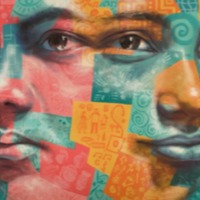
Before they came, we used to live peacefully in our village. Then our village was attacked by people from outside. On the first day of the attack the enemy came with fire and rockets. They burned out houses and killed. They had a lot of weapons. I ran away with my parents to hide in the bushes. I was not yet thirteen years old.
My name I Madeleine, I am now 15 years old and I come from the Democratic Republic of Congo. Now I am here at the UN to speak out and testify about my experience as a girl child soldier.
Our country was at war at that time. I became a child soldier because we were attacked and there was nobody to defend the country. I was home pounding cassava leaves when the militia took me away. I didn’t even say goodbye to my parents.
Some girls fought in the front lines. I did both, cooking and fighting.
On my first day at the camp the training was very hard, I don’t even know how I learned to kill. At first we didn’t have any guns. We used machetes and sometimes we used arrows. Then, once we killed the enemy we took away their guns. Sometimes we cut their throats.
When I got my first gun, it was hard. My body was shaking. I was scared. Then it became a joy to have a gun and to kill. I was feeling really good. It was a war. I couldn’t even tell you how many I killed. I just kept leaving bodies behind and moving on.
They used to give us marijuana to make us kill without fear. Smoking and drinking made us feel happy. It gave us a ferocity similar to animals.
There were a lot of rapes in the camp, but I prefer not to talk about it. You like it or not, five men will come to you. And you have no power to stop them. I didn’t want it. I was not prepared. They just did what they wanted. I was there for two years…two years. Even now, I still have it in my mind.
I go to school now. Bukeni’s Ngo Ajedi-ka, rescued me. They gave me counselling and they gave me money to study. But not many of my friends got the same chance. I know that of 30 girls, only 10 get help. But I do think they UN has a way of helping us.
United Nations, 2007 Commission on the Status of Women – Madeleine’s address
As a child soldier from the Congo I have to say we suffered a lot for having been used in combat, but especially for having been exploited as sex slaves. We regret the Criminal Court didn’t take into account charges of rape which would be great relief for us. Between 70 and 80 percent of the girls who have been demobilized came back with unwanted children, or with HIV AIDS.
But what did we do to deserve this tragedy? I think the world owes us an apology for this irreversible crime. Ladies and gentlemen, thank you.
Original narrative to be found here









